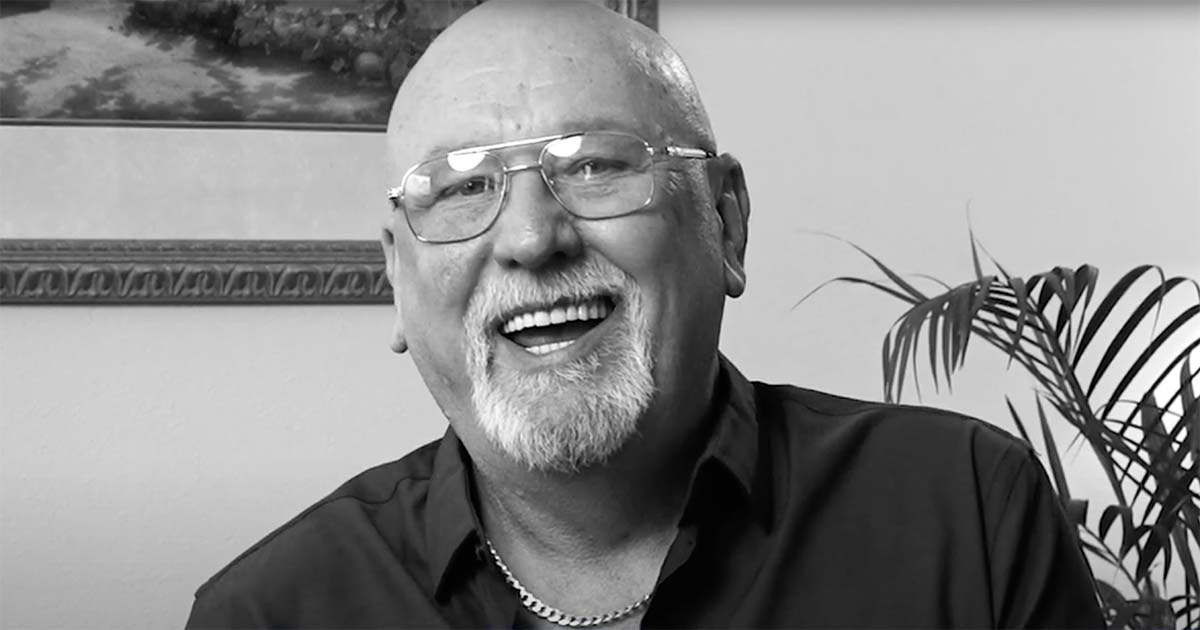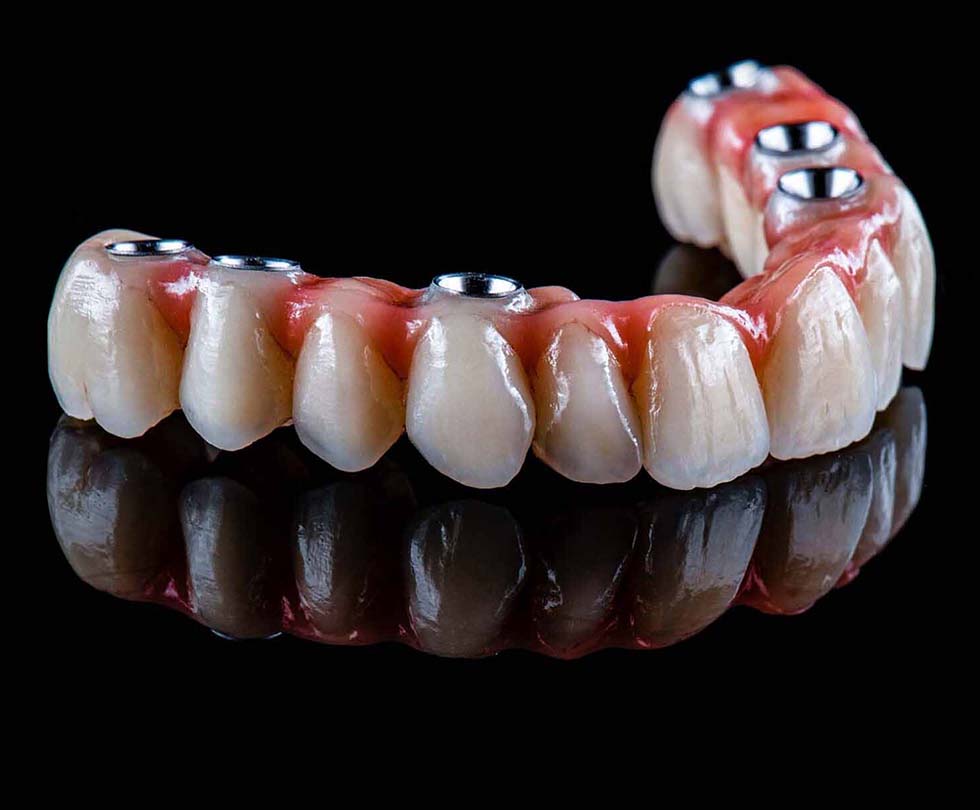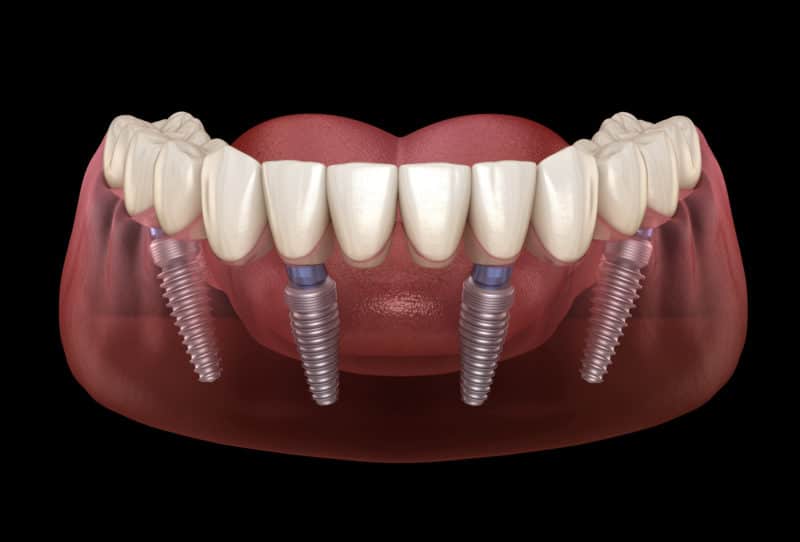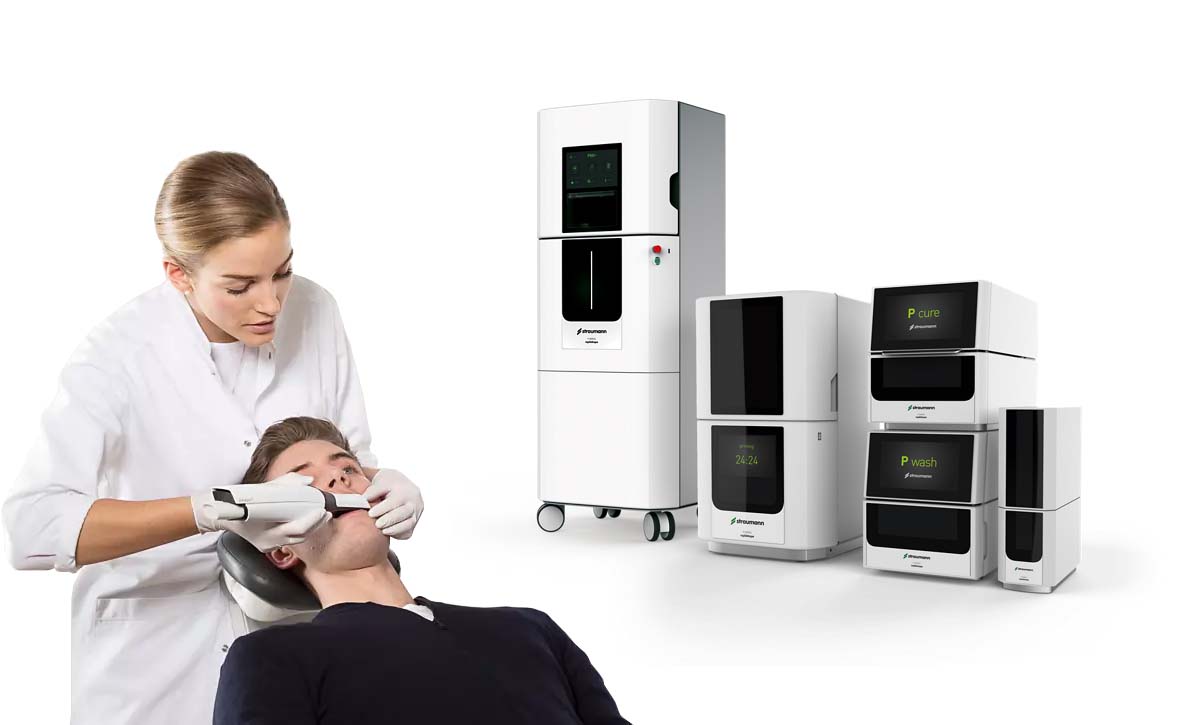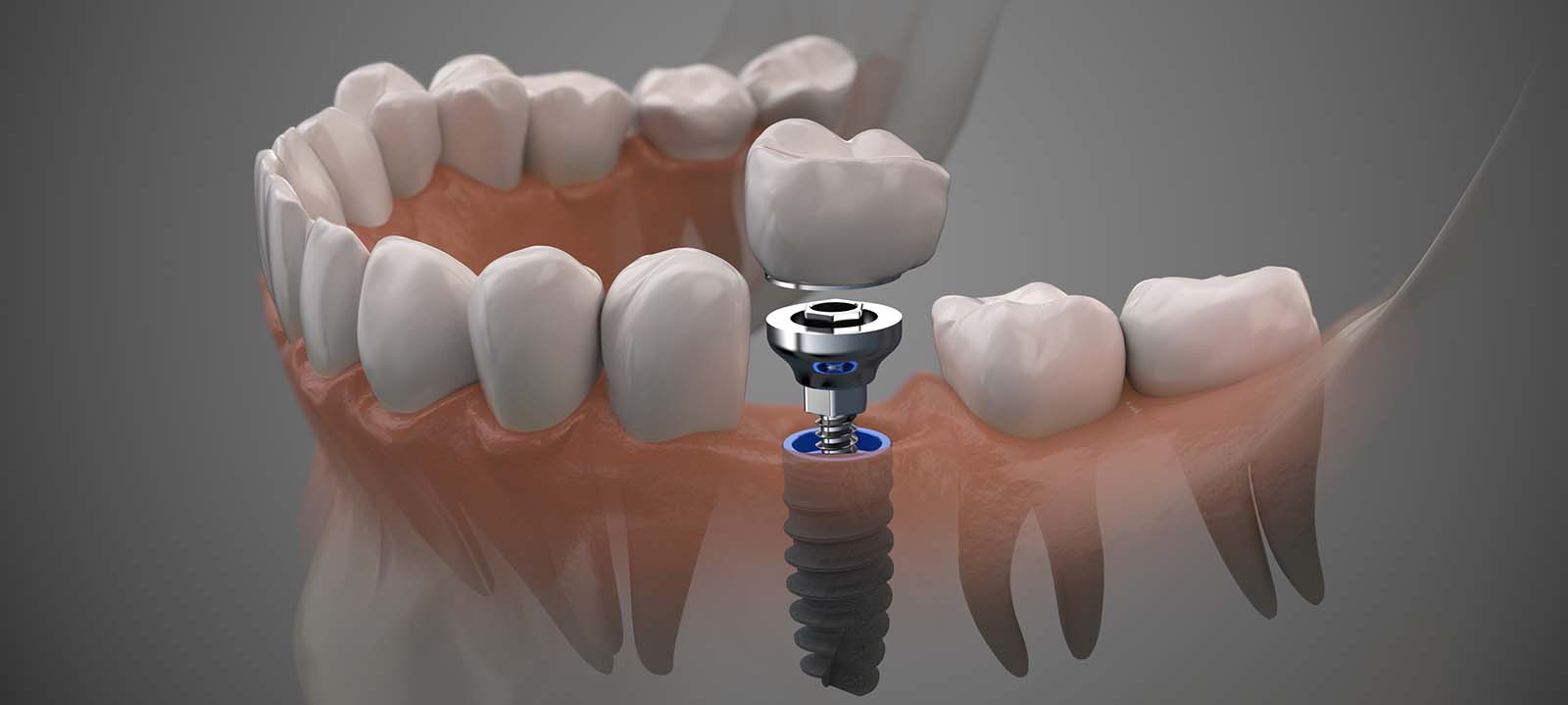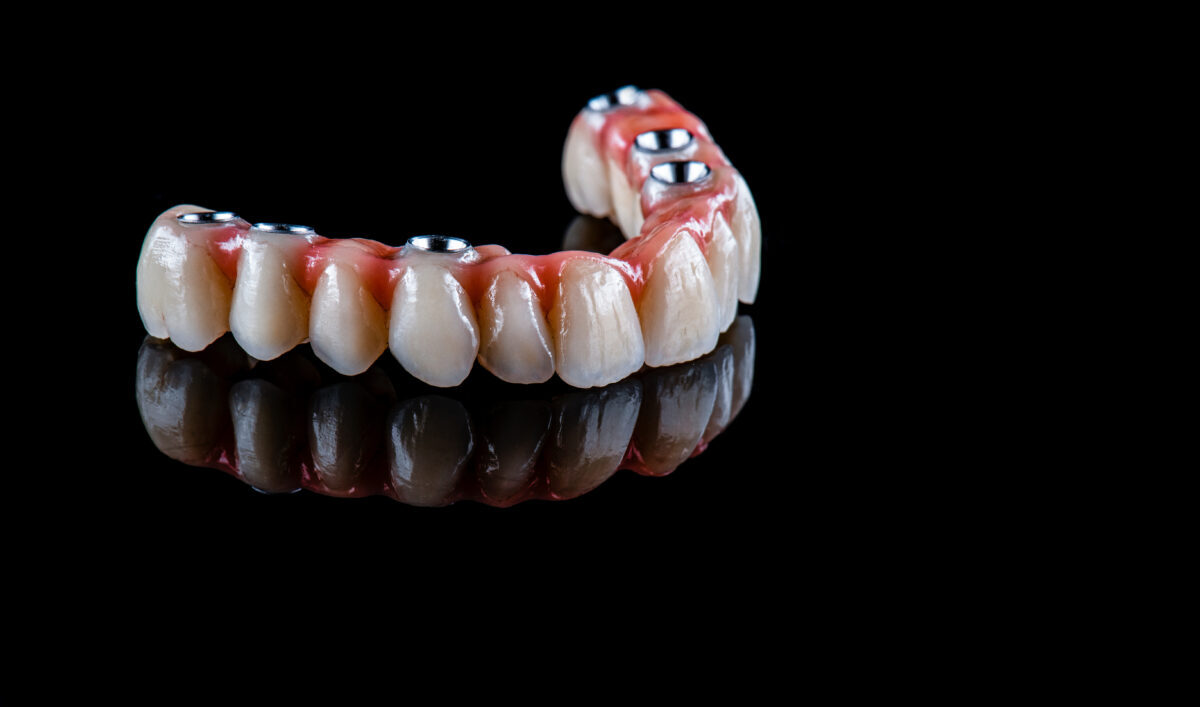A person’s dental formula is arguably the most conspicuous part of their face when they start talking, and it’s only normal to be self-conscious every time you are in front of people. For one reason or another, you may lose your teeth to gum diseases, tooth decay, or perhaps God forbid you happen to undergo a life-changing ordeal like an accident that fractures some of your teeth, it can be a nerve-wracking experience and reality, usually leading to a lost smile or weakened jawbone. Should that be the case, you need not worry as there are permanent teeth replacement methods available for restoring your smile.
Below is a detailed outline of some of the permanent teeth replacement methods.
What are dental implants?
A simple answer to what is a tooth implant, is that teeth implants are artificial teeth roots that provide a fixed base for new permanent teeth. They are usually metallic – Titanium and are surgically placed in the jawline, acting as anchors to the new incoming teeth implants.
Learn more about What are dental implants?
Are dental teeth implants secure?
After the titanium fixture settles on the jawline, with time, it begins to fuse with living bone cells forming a strong anchor. By so doing, there is minimal chance of slippage or unwarranted movement. For this reason, dental replacement implants are safe while eating, in addition, they require regular repairs.
How are dental implants done?
For better understanding, let us look at the dental implants timeline. Firstly, an incision is made into the gum tissue to expose the jaw bone and reflect a flap with the missing tooth. Next, a bone preparation is done, after which a specialized drill is used to drill the implant into position. At times, there is a need for bone grafting to ensure proper integration. Next, follows the stitching back of the tissue.
Generally, dental replacement is a painless procedure done under local anesthesia. Where there is a lot of anxiety detected from the patient, general anesthesia can be used.
For patients without enough gingival tissue and bone volume at the implant site, there is a recently introduced concept of flapless dental implant surgery, which is a better option.
After the implant placement is completed, a healing period of three months is emphasized to enable proper integration with the bone. It is after this period that the crown is placed. Temporary crowns are used during the healing process.
Dental teeth implants are an effective and popular method for replacing lost teeth compared to their dental dentures and bridges counterparts. Due to their best fit option and the real tooth close comparison, their demand is rising and is becoming the standard way of permanent teeth replacement.
Modes of installation;
- Single Implant.
- Multiple Implants.
- Full mouth implant.
They can be implemented in permanent single tooth replacement, multiple teeth, or the full set of lower and upper teeth. For some cases, a full arch teeth implants restoration is needed, whereby four implants are placed, followed by a full arch of teeth. The full mouth treatment derived its name “full arch” from this setup.
A dental replacement implant comprises of three parts, namely;
The implant: This part attaches to the jaw, permanently forming the root of your new teeth.
The abutment: This is a permanent connector, usually removable by a doctor, and supports and holds teeth implants together.
The crown: also known as a prosthetic tooth, is the visible part made of porcelain and acts for food grinding and chewing.
What are the reasons for dental implants?
1.Resolving joint pains, for example, biting problems arising when teeth shift into empty tooth spaces.
2. Restoration of chewing ability.
3. Securing dentures and bridges making them steady and comfortable.
4. Restoration of facial tissues.
5. Replacement of lost tooth.
What are the benefits of dental implants?
Gives an improved and better appearance: Naturally, the implants fuse with your bone making you feel and look like your own teeth.
Helps improve Speech: Teeth are essential for word-formation when we speak. After dental implants installation, you should be able to talk just fine.
Improved comfort: Unlike other removable teeth implants treatments, like dentures, you won’t have to worry about the possibility of implant slippage.
Enables chewing: The dental implants are steady enough to facilitate chewing as if they are the original teeth.
Improved self-esteem: Having a gap in the jawbone could be a buzz killer. The new-look gained by the implant is enough to restore your smile fully.
Improves oral health: Unlike the installation of bridges which require the alteration of the adjacent teeth, either by reducing them, during implant installation, all teeth are left intact. More so, individual implants allow one to reach in between for cleaning, thus enhancing oral health.
Durability: With the right amount of care, implants prove durable and don’t need constant repairs and replacements.
Offers Convenience: Dental implants eliminate the need for adhesives to keep them intact and well as eliminating the inconvenience of removing them from time to time.
How successful are dental implants?
Generally, there are very mild variances that could affect the longevity of an implant, such as their position on the jaw bone; for this reason, they can last a lifetime with a success rate of upto 99% if adhered to with proper care.
Who can get Dental Implants?
Generally, anyone deemed healthy to undergo basic dental extractions or oral surgery can partake in dental implant insertion and placement. Some of the key components to consider are if the patient has enough bone to hold the implant and healthy gums to prevent the spread of contaminants into the implant site.
In addition, those suffering from chronic disorders such as heart diseases or diabetes, heavy smokers, or those undergoing radiation therapy in the head area need to be checked individually.
It’s advisable to seek free dental implants consultation if you want to have a dental implants procedure done. Book an appointment to see a dental implants specialisty in Los Angeles. The dentist is at liberty to discuss the average cost of dental implants and single tooth implant cost.
Does Insurance cover dental implants?
Various insurance covers facilitate dental implants and their procedure. Coverage for dental implant cost under your medical plan is possible and is pegged on the type of plan you have and the cause of tooth loss. The average cost of dental implants coverage differs and your are advised to consult with your insurance.
How do I care for dental implants?
Well, dental implants require similar care to your real teeth, and this includes maintaining proper oral hygiene by brushing with correct toothpaste, flossing, and finally rinsing with antibacterial mouthwash.
More so, regular dental checkup needs to be maintained. Additionally, it’s advisable to avoid hard foods during the healing phase that might cause strain on the implant.
Are Dental Implants painful?
The feedback of several people who have undergone dental implants says minimal discomfort is experienced. If you are experiencing anxiety, local anesthesia can be used. Additionally, people report that dental implants are less painful, unlike tooth extraction.
People also ask, are implants as strong as real teeth?
Absolutely yes! Dental implants operate like real teeth. Simply because they fuse with the jaw bone creating a firm bond that allows for chewing and grinding food, you hardly feel any difference.
Are you wondering how do dental implants feel?
Usually, it would be very hard to detect the difference between artificial teeth and dental implants. The surgeons typically match their color with your teeth, giving them a similar look and feel. In essence, they are just like your regular teeth.
What is the dental implants timeline?
The dental implants procedure includes several processes such as;
1. Extraction.
Here the damaged tooth that the implant will override is removed. Normally, it requires some post-extraction healing time. Similarly, at this point, the surgeon determines if you need a bone graft to facilitate the proper base for the implant.
2. Bone grafting.
Not everybody needs a bone graft, but for those that do, there could be an additional time to allow for the bone material to hold and grow.
3. Implant insertion.
Normally, after two to three months after placement and having your bone grow as needed, the surgeons then place the implant’s base to a screw that holds onto the bone as the jaw gradually grows around it. Usually, you might get a temporary top as you await full growth around.
4.Healing phase.
Healing happens after the base has been placed into position. During this process, the body is healing as well, as the bone is growing and tightening its grip on the implant, forming a permanent bond. As the healing continues, it’s advisable to talk to your dentist to know what dietary changes you need to adapt to meanwhile.
5. Abutment and crown.
Once healing is complete, the dentist takes an impression of your teeth to fabricate the abutment, the crown foundation, and the crown itself. The Crown is usually the tooth-like part attached to the implant insertion.
Overall, the extraction to completion can take up to nine months.
What is the dental implant cost?
Dental implants are a great way of restoration of lost teeth permanently. However, the cost that comes with the procedure is the downhill side of things. The involved cosmetic surgery is costly and at times, having insurance isn’t enough.
The out-of-pocket expense is inevitable and mostly unaffordable to most people; full mouth implant costs are significantly higher and hinder many. The average cost of dental implants is out of range for many unless assisted by health insurances where applicable.
Is there same day dental implants?
Absolutely not! The process of acquiring dental implants is a lengthy process that usually can take up to nine months depending on the processes involved, i.e., grafting; therefore, same day dental implants are not viable.
What about Permanent Dentures?
A common question is what are denture implants?
Another way of replacing lost teeth is using permanent dentures, but first, let us look at denture implants? Dentures are typically false teeth implants usually attached to the jaw bone as an alternative to the removable ones.
Dentures offer a very cost-effective ay for permanent teeth replacement; however, their installation requires utmost care. If not done, it can cause slippage and shifting, thus bringing unnecessary discomfort in speech and eating.
Additionally, prolonged usage of dentures has been proven to cause jawbone shrinkage. Dentures usually contain a sticky adhesive which can be messy and uncomfortable in front of people.
All the above inconveniences are now solvable with the permanent dentures. These are held in place by several surgically placed dental implants thus can be used by the patients just like ordinary teeth for the smile, bite, eat and talk without the fear of them slipping and falling.
Are there different types of Permanent dentures?
Yes, different types of permanent dentures are;
Complete or Full Dentures.
Usually, full dentures are oral prosthetic devices that offer full coverage on the entire arch of the missing teeth. Its formation involves the dentist using a plastic base that matches the gum tissue to support the complete set of porcelain teeth. Surgically inserted dental implants and sealants firmly hold them.
Partial dentures
Partial dentures are naturally looking dental appliances used to restore the jaw bone and replace lost teeth.
They are created by using a metal framework or plastic base to support the replacement teeth. The framework then rests on your artificial teeth and is held in place by clasps.
Overdentures
These are commonly referred to as implant-supported dentures or snap-on dentures. They are held in place by the few remaining teeth or metal posts surgically implanted in the jaw, offering more versatility and stability than conventional dentures.
Dental Bridges
Dental bridges consist of fused pieces, enabling a perfect fit into open space left by missing teeth.
All-on-4 implant denture.
They are referred to as full arch dental implants bridges. Usually, they offer support for a full arch of teeth using only four implants. The result is even teeth implants that resemble the original in feel and function.
How are dentures placements done?
Firstly, an oral examination of the patient is done, followed by a jawbone scanning to identify where to place the implant. The locations are typically two anterior implants and two at the back jawbone.
After the healing period, the permanent dentures are then fixed.
What are the benefits of Permanent Dentures?
- Compared to other conventional implants, they require minimal surgical procedures, less healing time, and are less invasive.
- Offer more comfort in eating and speech.
- Don’t require regular removal for cleaning.
- Minimal implants are needed to hold them in place.
- Supporting facial features, thus giving a much younger and natural look.
Cons of permanent dentures.
1. Are expensive
2. At times discomfort, pain and swelling, and bruising are possible from the surgical process.
3. The implants require to be replaced every ten years.
4. Not everyone is eligible to get them.
Does insurance cover dentures?
Your medical plan determines the scale to which insurance covers dental dentures. Mostly, dental insurance may cover only a part of the overall cost of permanent dentures. For this reason, you should reach out to your insurance for clarification on the amount.
Factors to consider when wearing Dentures.
Although permanent dentures are deemed safe, they involve a surgical procedure. Furthermore, if not properly cleaned, they are prone to infections.
While they are costly at first, their long-run benefits outweigh the cost.
If you consider having dental implants, you are advised to seek free dental implants consultation and see a dental implants specialisty in Los Angeles.
Dentures vs dental implants
If you are planning on choosing between dentures vs dental implants, you ought to look at several factors that include;
Durability: Dental implants mostly last for years without removal or replacement, compared to dentures that need regular replacement and repairs when the sealants become worn, in the long run, result in more costs.
Insurance covers: In most cases, dentures are covered by insurance plans, unlike dental implants, which are referred to as cosmetic procedures, therefore not covered.
Long-term oral health: When it comes to dental implants, chewing stimulates the gum tissue, limiting its shrinkage and helps in bone preservation; in comparison to dentures, if ill-fitted, there is the possibility of bone loss.
Appearance: In some cases, the base in dentures can be large, giving a bulky feeling in the mouth, unlike dental implants, which form a perfect fit, and you’ll hardly feel the difference to your ordinary teeth.
Oral hygiene: Removable dentures need regular removal and cleaning, whereas dental implants can be hygienically maintained by brushing and flossing.
Dental implants and permanent dentures are great options for permanent teeth replacement. They help in the restoration of our precious smiles and allowing for better chewing and speech formation. If you want to have either of the two, seek free dental implants consultation to see a dental implants specialisty in Los Angeles. The dentist will give you a breakdown of single tooth implant cost and full mouth implant costs. Be sure to inquire about any information regarding teeth care and maintenance.
If you are looking for the best Los Angeles Dental Implants specialist, call Southland Dental Care today and schedule your free dental implants consultation.





